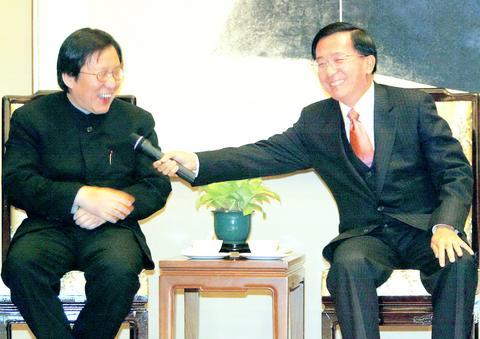President Chen Shui-bian (
"The `five noes' promise I made in my inauguration speech is conditional upon Communist China's not intending to take military action against Taiwan," Chen said.

PHOTO: CNA
"But during the past three years, Beijing has put in place more ballistic missiles targeting Taiwan, expanded its military expenditure on a large scale and repeatedly threatened Taiwan," he said.
"All of these [actions] have clearly displayed its intention of using force against Taiwan." Chen said. "Therefore, my `five noes' actually cease to exist while China's wields the threat of military action.
"The reason that I still pledge to firmly maintain the `five noes' is because I am willing to make a concession, to compromise with the other side of Taiwan Strait," Chen said, adding that he could not keep making compromises without gaining safeguards for Taiwan's dignity and safety.
Chen made the remarks at a "glutinous rice ball" party to mark the winter solstice yesterday.
He said his administration had endeavored to improve cross-strait relations over the past three years, but that his humble approach had failed to get a positive reaction from Beijing.
"From this moment on, if China tries to launch any missile -- as it did in 1996 to threaten the people of Taiwan to affect the presidential election -- I will revoke the `five noes,'" Chen said.
He said he would cancel the planned "defensive referendum" should China withdraw its missiles or renounce the use of force against Taiwan.
Chen said the "defensive referendum" should be called a "peaceful referendum." He said the referendum is a basic right of all people of Taiwan, a measure to strengthen the nation's democracy and a modest request to maintain the status quo of independence.
"Some say the referendum ... is not necessary because everyone knows what the result of the referendum will be," Chen said. "Some opposition politicians even say that such a topic should be left to the Legislative Yuan.
"I want to remind them that advanced democratic countries have their own parliament and may also use referendums to make up the insufficiency of representative democracy," he said.
"When people leave their home and go to the booth to cast their votes to ask China to withdraw its missiles and renounce the use of military force, it will bring a completely different reaction and carry a significance different from that of a legislative resolution," Chen said.
"Only because we hold the peaceful referendum will the entire international community pay attention to this small island," he said. "Only through this opportunity can we make the international community understand the real situation in the Taiwan Strait.
"It is the best way to maintain Taiwan's security," he said, adding the referendum would not violate the "five noes" and is designed to maintain the status quo.
As to whether he has US support for the referendum, Chen said communication between two countries' governments is proceeding and that it takes time to eliminate misgivings or anxiety.
"I think the crucial moment in the US-Taiwan relationship is in the next three to five months," he said, adding that he believes the US is more concerned about his inauguration speech on May 20 than the defensive referendum.

FALSE DOCUMENTS? Actor William Liao said he was ‘voluntarily cooperating’ with police after a suspect was accused of helping to produce false medical certificates Police yesterday questioned at least six entertainers amid allegations of evasion of compulsory military service, with Lee Chuan (李銓), a member of boy band Choc7 (超克7), and actor Daniel Chen (陳大天) among those summoned. The New Taipei City District Prosecutors’ Office in January launched an investigation into a group that was allegedly helping men dodge compulsory military service using falsified medical documents. Actor Darren Wang (王大陸) has been accused of being one of the group’s clients. As the investigation expanded, investigators at New Taipei City’s Yonghe Precinct said that other entertainers commissioned the group to obtain false documents. The main suspect, a man surnamed

DEMOGRAPHICS: Robotics is the most promising answer to looming labor woes, the long-term care system and national contingency response, an official said Taiwan is to launch a five-year plan to boost the robotics industry in a bid to address labor shortages stemming from a declining and aging population, the Executive Yuan said yesterday. The government approved the initiative, dubbed the Smart Robotics Industry Promotion Plan, via executive order, senior officials told a post-Cabinet meeting news conference in Taipei. Taiwan’s population decline would strain the economy and the nation’s ability to care for vulnerable and elderly people, said Peter Hong (洪樂文), who heads the National Science and Technology Council’s (NSTC) Department of Engineering and Technologies. Projections show that the proportion of Taiwanese 65 or older would

Democracies must remain united in the face of a shifting geopolitical landscape, former president Tsai Ing-wen (蔡英文) told the Copenhagen Democracy Summit on Tuesday, while emphasizing the importance of Taiwan’s security to the world. “Taiwan’s security is essential to regional stability and to defending democratic values amid mounting authoritarianism,” Tsai said at the annual forum in the Danish capital. Noting a “new geopolitical landscape” in which global trade and security face “uncertainty and unpredictability,” Tsai said that democracies must remain united and be more committed to building up resilience together in the face of challenges. Resilience “allows us to absorb shocks, adapt under

Taiwan Semiconductor Manufacturing Co (TSMC, 台積電) yesterday said it is building nine new advanced wafer manufacturing and packaging factories this year, accelerating its expansion amid strong demand for high-performance computing (HPC) and artificial intelligence (AI) applications. The chipmaker built on average five factories per year from 2021 to last year and three from 2017 to 2020, TSMC vice president of advanced technology and mask engineering T.S. Chang (張宗生) said at the company’s annual technology symposium in Hsinchu City. “We are quickening our pace even faster in 2025. We plan to build nine new factories, including eight wafer fabrication plants and one advanced